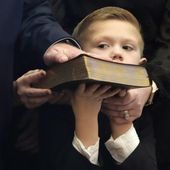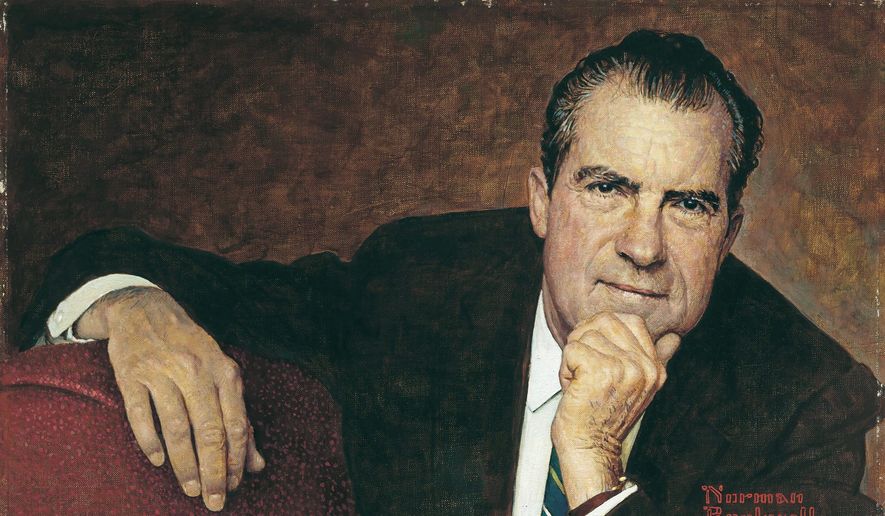OPINION:
Memorial Day in America has traditionally been a time when we pay our respects to those who gave their lives, over a century ago, in a tragic civil war. In a broader sense, it has come to stand not only for the sacrifice of those who served in the War Between the States, but for all of those who have given their lives in arms since the birth of our nation.
This Memorial Day should remind us of the greatness that past generations of Americans achieved, from Valley Forge to Vietnam, and it should inspire us with the determination to keep America great and free by keeping America safe and strong in our own time, a time of unique destiny and opportunity for our nation.
In looking back on the past, we must not forget the present. More than 100 years after the last shot was fired at Gettysburg, and nearly 200 years after the signing of the Declaration of Independence, the cause of liberty and human dignity still depends on America.
Americans were called away to war under trying and sometimes bitter circumstances, four times in this century — World War I, World War II, Korea, and Vietnam. Only today, for the first time in this century do we live in a time when, thanks to past sacrifices, a real chance exists for lasting peace — peace built not on vain hopes and good intentions, but on solid, realistic foundations.
We have ended Americas longest and most difficult war in Vietnam. In the Middle East, a part of the world where conflict has become almost a way of life, we have begun the long, hard work of reconciliation — of bringing people together at the peace table who formerly met only on the battlefield. We are normalizing relations with the nation whose people make up one-fourth of the worlds population — the Peoples Republic of China. We have developed a new relationship with the leaders of the Soviet Union after a long and costly period of confrontation that began more than a quarter of a century ago.
Taken together, all of this means that in 1974 our hopes for a lasting peace are brighter than at any time in living memory, because we now have a structure of peace, and we are carefully working to strengthen it. A momentum has been created that makes it easier for the leaders of the major powers to settle differences peacefully, in negotiation instead of in armed confrontation.
That is something worth bearing in mind on this Memorial Day. It is something worthy of our thanks. But it is not something we can take for granted. Just as a planted seed requires the right balance of sun, water, soil, and care to grow to its full potential, so, too, does a lasting peace.
The minute that peace is taken for granted — and we have seen this happen again and again in the course of modern and ancient history — its survival is in jeopardy. Lasting peace can be achieved only through lasting awareness, lasting preparedness, and lasting strength, both physical and moral. As America and other nations have learned only too well through experience, weakness invites aggression, and aggression triggers war.
On this Memorial Day, then, let us bear in mind what Winston Churchill once called the “sinews of peace” — the ways and means through which we can keep America a credible and strong force for peace and order in the world. There are some people here in America who would like to turn inward and turn away from the worlds problems. We have enough problems of our own, they say, without getting involved in anyone elses.
And up to a point, they are right. We are, and must continue to be, a nation dedicated to building the best possible life for our people, to overcoming injustice, to expanding opportunity to embrace every American, regardless of race or creed. But like it or not, we are also a part of a larger world. We may seek to ignore the world, but the world will not ignore us. And in a day when atomic weapons are spreading, when famine stalks large parts of the Earth, and when the tinder that could ignite another massive conflagration exists in many parts of the world, to turn our backs on our responsibilities for world leadership would, in the long run, be disastrous not only for us in America, but also for all people in the world who seek peace.
There was a time when we could look across the oceans, protected by time and distance, and let other peoples, such as the British and the French, carry the burden of free-world security. They had the power and the will to do it, and America could afford in those long-gone days to live in what used to be called “splendid isolation.” But those days are no more. Today, Americas isolation can lead only to the worlds destruction.
It is for this reason that the Atlantic Alliance is today the cornerstone of this nations foreign policy. Together with our NATO allies, we are united in the common effort of defense and in the common quest for a more peaceful, more stable world. We can and we have, under the Nixon Doctrine, placed wise limits on future commitments of American manpower, not only in Asia, but in other parts of the world as well. At the same time, we have recognized our broad responsibilities of U.S. leadership, the leadership required, for example, to help keep the peace where it exists and to act as peacemaker in explosive areas like the Mideast.
Diplomatically, we fulfill this role by using the best possible men and ideas in our dealings with other nations. And the records show that we have been successful in doing this in the past five years. But no matter how talented our diplomats are, the policies they pursue must be backed up by credible strength — the “sinews of peace.” And in the final analysis, this means military strength.
As long as the peace of the world depends on it — and it does — America must never become the second-strongest nation in the world. If successful negotiations for weapons limitation and reductions are to continue, America must remain strong.
Only a strong America, in concert with its allies, can be a strong force for peace.
A bipartisan majority of the House of Representatives stood firmly for a strong national defense. In so doing, that majority earned the thanks of all Americans who recognize that a strong America is indispensable if we are to succeed in building lasting peace in the world.
On the issue of a strong America, the Congress should not be separated by party labels, but united as patriotic Americans. The same should be true of all of us as citizens, and especially so on a day like this. Today, on this Memorial Day 1974, we can all be thankful that for the first time in 12 years, there are no Americans fighting anywhere in the world.
What we do with this peace — whether we preserve it and defend it, or whether we lose it and let it slip away — will be the measure of our worthiness of the spirit and sacrifice of the hundreds of thousands who gave their lives in two World Wars, Korea, and in Vietnam.
I believe that we can be worthy of that challenge, because I believe that for the first time in this century, thanks to the sacrifices of the past and because of our determination to stay strong now and in the future, we can keep the peace they gave their lives to win for us.
Peace is the real and right memorial for those who have died in war. They wanted and they deserve a world in which their brothers and sisters and their children and grandchildren will never have to be called upon, as they were, to fight for peace. Let that be the memorial we seek to build for them, and let us work together — the president, the people, the Congress — to build it in the months and years ahead.




Please read our comment policy before commenting.